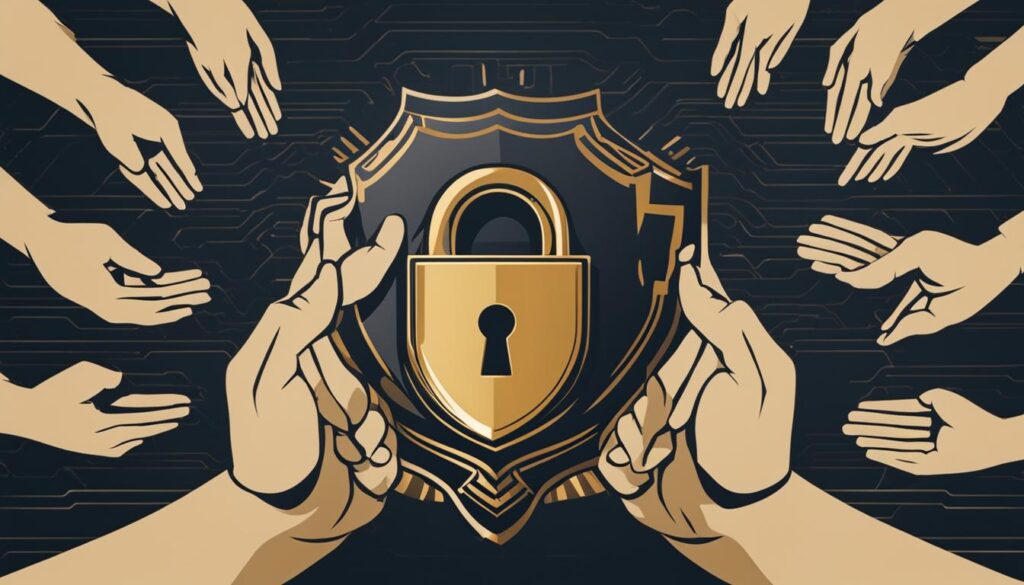Welcome to our comprehensive guide on understanding the violation of privacy risks and rights. In today’s digital age, where personal information is constantly being shared and collected, it is crucial to have a solid grasp of the potential risks and your rights pertaining to privacy infringements. This article aims to provide you with an in-depth understanding of privacy concerns, common forms of violations, historical perspectives, legal frameworks, the impact of privacy breaches, and practical measures to safeguard your privacy.
The violation of privacy, also referred to as privacy infringement, breach of privacy, or privacy violation, occurs when an individual’s personal information or privacy rights are compromised without their consent. This can include various scenarios such as unauthorized access to personal data, surveillance, or invasion of privacy.
By exploring the historical perspectives on privacy, we can gain insights into how the concept has evolved over time and the societal factors that have shaped privacy norms. Additionally, we will delve into the violation of privacy in the digital age, discussing online data collection practices, social media privacy concerns, and real-life privacy breach incidents.
An understanding of the legal framework governing privacy protection is essential for individuals and organizations alike. We will explore international privacy laws, as well as the specific right to privacy in the United States, highlighting its implications and enforcement.
The impact of a privacy breach can be significant and far-reaching. We will analyze the individual consequences, including emotional distress and identity theft, as well as the business implications of failing to protect consumer privacy, such as legal repercussions and loss of customer trust.
But fear not, we will also provide practical measures to safeguard against privacy violations. These include using strong passwords, enabling two-factor authentication, and being cautious with sharing personal information online.
As technology advances, new forms of privacy concerns emerge. We will examine innovations in surveillance technology and the emerging threats to personal privacy they pose.
Should you find yourself a victim of privacy violation, it’s crucial to understand your rights and the legal recourse available. We will discuss the options for seeking restitution and damages in privacy cases.
In conclusion, this guide aims to equip you with the knowledge needed to recognize and respond to privacy violations effectively. Together, we can strengthen privacy awareness and protection in this rapidly evolving digital landscape.

Key Takeaways:
- Violation of privacy refers to the unauthorized access or compromise of personal information or privacy rights.
- Understanding the historical perspectives on privacy provides insights into the evolution of privacy norms.
- Privacy infringement in the digital age encompasses online data collection, social media privacy concerns, and privacy breach incidents.
- International privacy laws and the right to privacy in the United States govern privacy protection.
- A privacy breach can have severe consequences for individuals and businesses alike.
What Constitutes a Violation of Privacy?
In order to fully understand privacy infringement, it is important to first define the concept of personal privacy. Personal privacy refers to an individual’s right to control the access, use, and dissemination of their personal information. It encompasses the protection of sensitive data, confidentiality, and the ability to establish boundaries regarding the collection and use of personal information.
Common forms of privacy infringement vary in nature, but all involve the unauthorized access or misuse of personal information. These violations can have serious consequences for individuals, including potential identity theft, reputational damage, and emotional distress.
To shed light on the different ways privacy can be infringed upon, let’s explore some of the most prevalent forms of privacy infringement:
1. Surveillance: This includes any form of monitoring or tracking of an individual’s activities, either online or offline, without their knowledge or consent. Surveillance techniques can involve the use of hidden cameras, tracking devices, or digital surveillance tools.
2. Data Breaches: A data breach occurs when unauthorized individuals gain access to sensitive personal information stored by organizations. This can lead to the exposure of personal data, such as names, addresses, social security numbers, or financial information.
3. Unauthorized Access: Unlawful access to personal information refers to the situation where a third party gains access to an individual’s private data without their authorization. This can occur through hacking, phishing attacks, or by exploiting vulnerabilities in digital systems.
By understanding these common forms of privacy infringement, individuals can better protect themselves and take proactive steps to safeguard their personal information.
Historical Perspectives on Privacy
In this section, we will explore the historical context of privacy and how it has evolved throughout history. Understanding the origins and development of privacy is crucial to comprehending its significance in society today.
Privacy, in various forms, has been valued and protected since ancient times. In ancient civilizations, such as ancient Egypt and Mesopotamia, individuals had private spaces within their homes where they could retreat and maintain a sense of personal autonomy.
During the Middle Ages, privacy took on new dimensions with the rise of feudal society. Castles and fortified residences allowed nobility to safeguard their private lives and shield themselves from external interference.
The Enlightenment period in the 18th century marked a turning point in the discussion of privacy. Philosophers like John Locke and Jeremy Bentham emphasized the importance of individual rights, including the right to privacy and autonomy over personal matters.
With the advent of the Industrial Revolution in the 19th century, privacy faced new challenges. Urbanization and the rise of mass surveillance created concerns about the erosion of personal privacy. As society transitioned into the modern era, technological advancements further complicated the concept of privacy.

Today, privacy remains a dynamic and evolving topic. The digital age has presented new opportunities, but it has also raised concerns about data privacy and surveillance. Exploring the historical perspectives on privacy allows us to navigate the complexities of our modern world and make informed decisions about the protection of our personal information.
Violation of Privacy in the Digital Age
In today’s digital age, the issue of privacy has become increasingly complex and challenging. The widespread use of technology and the internet has led to new and pervasive forms of privacy violation. This section will explore the specific challenges and risks associated with privacy in the digital age, focusing on online data collection, social media privacy concerns, and privacy breach incidents.
Online Data Collection
The digital era has ushered in a flood of online data collection practices, where personal information is harvested and stored by various entities. From browsing habits to location data, companies collect vast amounts of information to create detailed profiles of individuals. This data is often used for targeted marketing, personalized advertisements, and even sold to other organizations.
Online data collection raises concerns about individual privacy and the potential misuse of sensitive information. Users may be unaware of how their data is being collected and used, and this lack of transparency can lead to privacy breaches and violations.
Social Media and Privacy Concerns
Social media platforms, with their vast user base and interconnected nature, present unique privacy concerns. Users often share personal information, photos, and opinions on these platforms, creating a wealth of data that can be exploited. Privacy settings on social media sites may not always be fully understood or utilized, leaving users vulnerable to privacy breaches.
Additionally, social media platforms have faced scrutiny for their data privacy practices, including incidents where user data has been accessed by unauthorized parties or misused for political or commercial purposes. These privacy concerns have prompted calls for increased regulation and transparency in the social media space.
Privacy Breach Incidents and Case Studies
Privacy breach incidents have become increasingly common in the digital age, affecting individuals and organizations alike. These incidents involve unauthorized access to personal data, data breaches, or the inadvertent exposure of sensitive information. Such breaches can have far-reaching consequences, including identity theft, financial loss, reputational damage, and emotional distress for individuals.
Real-life case studies serve as valuable examples of privacy breaches and their impact. By examining these incidents, we gain insight into the potential consequences of privacy violations and the importance of robust privacy protection measures.
The Legal Framework Governing Privacy Protection
Ensuring privacy protection requires a robust legal framework that establishes standards and regulations to safeguard individuals’ personal information. This section provides an overview of the legal landscape governing privacy and explores international privacy laws as well as the right to privacy in the United States.
International Privacy Laws
Privacy is a global concern, and many countries have enacted legislation to protect individuals’ personal information. International privacy laws establish guidelines for data handling, consent, cross-border data transfers, and individuals’ rights regarding their personal data.
Some significant international privacy laws include:
- European Union General Data Protection Regulation (GDPR)
- Canada’s Personal Information Protection and Electronic Documents Act (PIPEDA)
- Australia’s Privacy Act 1988
These laws aim to ensure a high level of privacy protection and give individuals control over their personal data even when interacting with organizations outside their home country.
Right to Privacy in the United States
In the United States, the right to privacy is not explicitly mentioned in the Constitution. However, it is recognized and protected through various federal and state laws, court decisions, and constitutional interpretations.
The Fourth Amendment to the U.S. Constitution provides protection against unreasonable searches and seizures, which sets the foundation for privacy rights. Additionally, specific privacy laws govern different sectors, such as healthcare (HIPAA), financial services (Gramm-Leach-Bliley Act), and children’s privacy (Children’s Online Privacy Protection Act).
While the United States does not have a comprehensive privacy law like the GDPR, there have been ongoing discussions and legislative proposals to enhance privacy protections at the federal level.

| Country | Key International Privacy Laws |
|---|---|
| European Union | General Data Protection Regulation (GDPR) |
| Canada | Personal Information Protection and Electronic Documents Act (PIPEDA) |
| Australia | Privacy Act 1988 |
Evaluating the Impact of a Privacy Breach
In this section, we will discuss the impact of a privacy breach on both individuals and businesses. We will explore the potential consequences for individuals, including emotional distress, identity theft, and reputational damage. Additionally, we will examine the business implications of failing to protect consumer privacy, such as legal repercussions and loss of customer trust.
| Individual Consequences of Privacy Violations | Business Implications of Failing to Protect Consumer Privacy |
|---|---|
|
|
Practical Measures to Safeguard Against Privacy Violation
Safeguarding your privacy is crucial in today’s digital landscape. By implementing effective privacy protection measures and best practices, you can minimize the risk of privacy violations and protect your personal information from unauthorized access. Here are some practical tips to help you maintain your privacy:
- Use strong and unique passwords for all your online accounts. Incorporate a mix of uppercase and lowercase letters, numbers, and special characters.
- Enable two-factor authentication (2FA) whenever possible. This adds an extra layer of security by requiring a second form of verification, such as a temporary code sent to your mobile device.
- Regularly update and patch your software and devices. Software updates often include important security fixes that help safeguard against potential vulnerabilities.
- Be cautious when sharing personal information online. Think twice before posting sensitive details on social media or sharing them with unknown individuals or websites.
- Use a virtual private network (VPN) when connecting to public Wi-Fi networks. A VPN encrypts your internet traffic, making it harder for hackers to intercept and access your data.
- Regularly review the privacy settings on your social media accounts and adjust them to your comfort level. Limit the amount of personal information visible to others.
- Be mindful of phishing attempts and suspicious emails. Avoid clicking on links or downloading attachments from unknown senders.
- Consider using privacy-focused web browsers and search engines that prioritize user privacy and offer advanced privacy features.
Implementing these privacy protection measures can significantly reduce the risk of privacy violations and enhance your online privacy. By taking proactive steps to safeguard your privacy, you can confidently navigate the digital world while protecting your personal information from unauthorized access.

Technological Advances and Privacy Concerns
In today’s digital age, technological advances have brought about significant changes in our lives. While these advancements offer convenience and efficiency, they also raise concerns about privacy. Innovations in surveillance technology, such as facial recognition and biometric data collection, have emerged as key areas of focus when considering the impact on personal privacy.
Innovations in Surveillance
Surveillance technology has evolved rapidly, enabling more sophisticated methods of monitoring individuals and their activities. Facial recognition, for example, has become increasingly prevalent in various sectors, including law enforcement, banking, and retail. This technology utilizes algorithms to identify and track individuals based on their facial features, raising questions about the potential invasion of privacy and the ethical implications surrounding its use.
Another innovative surveillance technique is the collection and analysis of biometric data. Biometrics involves the measurement and analysis of unique physical and behavioral characteristics, such as fingerprints, voice patterns, and gait. While biometrics offer enhanced security and convenience in authentication, the widespread adoption of such technologies also brings about concerns regarding the storage and use of personal biometric information.
These advancements in surveillance technology have significantly expanded the capabilities of monitoring and tracking individuals, leading to the need for a reassessment of privacy rights and regulations.
Emerging Threats to Personal Privacy
As technological advancements continue to accelerate, emerging threats to personal privacy have also emerged. One such threat is the increasing accessibility and availability of personal data. With the proliferation of online platforms, social media, and the Internet of Things (IoT), individuals are continuously generating and sharing vast amounts of personal information. This data, if not adequately protected, can be exploited by malicious actors and potentially lead to privacy breaches.
Furthermore, the rise of sophisticated cyberattacks poses significant risks to privacy. Hackers and cybercriminals are continually finding new ways to exploit vulnerabilities, accessing sensitive information without permission. Data breaches have become more frequent and impactful, exposing individuals’ personal details and compromising their privacy.
Additionally, the integration of smart home devices and wearable technology has raised concerns about the potential invasion of privacy within personal spaces. These devices collect and analyze data related to individuals’ behaviors, habits, and preferences, giving rise to privacy concerns surrounding data ownership, consent, and control.
In light of these technological advances and emerging threats to privacy, it is crucial to address these concerns and establish comprehensive frameworks that protect individuals’ privacy rights while allowing for continued innovation and development.
Understanding Your Rights in the Event of a Privacy Violation
Legal Recourse for Victims
In the unfortunate event of a privacy violation, it is crucial for individuals to be aware of their rights and the legal recourse available to them. If you believe your privacy rights have been infringed upon, there are several steps you can take to seek justice and hold responsible parties accountable.
First, it is important to gather evidence of the privacy violation. This can include screenshots, emails, or any other documentation that supports your claim. Additionally, keeping a record of any relevant dates and times will strengthen your case.
Once you have collected evidence, you can choose to file a complaint with a regulatory body or authority that deals with privacy rights violations. In the United States, for example, individuals can file a complaint with the Federal Trade Commission (FTC) or the relevant state attorney general’s office. These regulatory bodies have the authority to investigate privacy violations and take appropriate action against those responsible.
If the privacy violation has caused significant harm or damages, you may also have the option to pursue a lawsuit against the responsible party. Depending on the circumstances, you may be eligible to seek compensation for privacy violation damages, which can include monetary compensation for any financial losses, emotional distress, or reputational damage endured as a result of the violation.
When pursuing legal recourse, it is advisable to seek the guidance of an experienced privacy lawyer who can provide expert advice and representation throughout the process. They can help you understand the legal options available to you and navigate the complexities of privacy laws.
Remember, understanding your rights and taking appropriate legal action not only helps you seek justice for the privacy violation you experienced but also contributes to the protection of privacy rights for others.
Restitution and Damages in Privacy Cases
In privacy cases, the concept of restitution and damages is crucial in compensating individuals who have experienced privacy violations. Restitution refers to the restoration of an individual’s privacy and the measures taken to rectify any harm caused by the violation. Damages, on the other hand, refer to the monetary compensation awarded to the victim for the losses they have suffered.
Privacy violation damages can include:
- Monetary losses: Compensation for any financial harm caused by the violation, such as loss of funds due to identity theft or unauthorized access to financial accounts.
- Emotional distress: Compensation for the psychological and emotional impact of the privacy violation, including stress, anxiety, and other mental health issues.
- Reputational damage: Compensation for any harm caused to an individual’s reputation as a result of the privacy violation, which may affect personal or professional relationships.
The amount of compensation awarded in privacy cases varies depending on the severity of the violation, the extent of harm suffered, and the jurisdiction in which the case is heard. Privacy violation damages can range from a few thousand dollars to substantial settlements, particularly in cases involving large-scale data breaches or intentional misuse of personal information.
It is important to note that pursuing restitution and damages in privacy cases can be a complex process. Seeking the assistance of a skilled privacy lawyer who specializes in privacy rights can greatly increase your chances of obtaining a fair and just outcome.

Violation of Privacy: Recognize and Respond
When it comes to privacy, it is crucial to understand how to recognize and respond to a privacy violation or breach. Taking quick action is essential to minimize the potential damage and protect your personal information. This section will provide you with practical steps to follow in the event of a privacy incident.
Recognizing a Privacy Violation
Identifying a privacy violation can sometimes be challenging, as it may not always be obvious. However, there are certain signs that can help you recognize when your privacy has been compromised:
- Unusual account activity or unauthorized transactions
- Receiving unsolicited emails or messages containing personal information
- Unexpected changes to your privacy settings or security questions
- Noticing personal information shared publicly without your consent
- Being alerted by a data breach notification from a company or service you use
Responding to a Privacy Breach
Once you suspect or confirm a privacy breach, it’s crucial to take immediate action to protect yourself and your data. Here are the steps you should follow:
- Report the violation: Contact the appropriate authorities, such as your local law enforcement agency or the data protection commissioner, to report the incident.
- Secure affected accounts or data: Change passwords and enable two-factor authentication for all compromised accounts. Be sure to also update security settings and review permissions for third-party applications.
- Notify relevant parties: Inform the company or service provider involved in the privacy breach so they can take appropriate action. Additionally, consider notifying your bank or credit card provider if financial information has been compromised.
- Monitor your accounts and credit: Regularly check your financial accounts for any suspicious activity and monitor your credit reports to ensure no fraudulent accounts have been opened in your name.
- Seek professional assistance if necessary: If you experience significant financial or emotional consequences as a result of the privacy breach, seek legal counsel or consult professionals specializing in privacy incident response.
By recognizing a privacy violation and taking prompt action, you can mitigate the potential risks and protect yourself from further harm. It is important to stay proactive in safeguarding your privacy and staying informed about best practices for privacy protection in an increasingly digital world.
Conclusion
In today’s digital landscape, the protection of privacy has become increasingly crucial. Throughout this article, we have explored the risks associated with the violation of privacy and the rights individuals have in relation to their personal information. By understanding these risks and rights, we can take proactive measures to strengthen privacy awareness and protection.
Strengthening Privacy Awareness and Protection
One of the key takeaways from this discussion is the importance of privacy awareness. It is crucial for individuals and organizations alike to be informed about the potential risks and vulnerabilities they may face in the digital world. By staying informed and educated, we can make more informed decisions about how we handle and share our personal information.
Furthermore, implementing privacy protection measures is essential in safeguarding against privacy violations. This includes using secure passwords, enabling two-factor authentication, being cautious when sharing personal information online, and staying vigilant against potential threats.
Future Outlook on Privacy Rights and Legislation
Looking ahead, the future of privacy rights and legislation is likely to evolve in response to emerging technologies and changing societal norms. As advancements such as artificial intelligence, Internet of Things, and biometric data collection continue to shape our digital landscape, it is essential for privacy laws and regulations to adapt accordingly. This may involve updating existing laws, creating new frameworks, and establishing stricter consequences for privacy violations.
As individuals, it is important to stay engaged in conversations about privacy rights and actively participate in advocating for stronger privacy protections. Additionally, it is crucial to stay informed about changes in privacy legislation and understand the implications they have on our personal privacy.
FAQ
What is considered a violation of privacy?
A violation of privacy refers to any act or behavior that infringes upon an individual’s right to keep their personal information or affairs private. This can include unauthorized surveillance, data breaches, invasion of personal space, or any other action that compromises an individual’s privacy without their consent.
What are some common forms of privacy infringement?
Common forms of privacy infringement include surveillance (both online and offline), unauthorized access to personal information, identity theft, stalking, cyberbullying, and unwanted intrusion into private spaces or communications.
How has privacy evolved throughout history?
Privacy has evolved over time, influenced by various factors such as cultural norms, technological advancements, and legal developments. In the past, privacy was primarily associated with physical spaces and the ability to maintain secrecy. However, in the digital age, the concept of privacy has expanded to include the protection of personal data, online communications, and individual autonomy.
What are the privacy concerns related to the digital age?
In the digital age, privacy concerns primarily revolve around online data collection practices, social media, and privacy breach incidents. Online platforms and websites collect vast amounts of personal data, often without explicit user consent, raising concerns about how that data is used and shared. Social media platforms also pose privacy risks, as users may inadvertently share sensitive information or become targets of online harassment. Privacy breach incidents, such as data breaches or hacking, can expose individuals’ personal information and lead to identity theft or financial loss.
What are the international and United States privacy laws?
International privacy laws vary by country but generally focus on protecting individuals’ privacy rights and regulating how organizations handle personal data. Some notable international privacy laws include the European Union’s General Data Protection Regulation (GDPR) and the California Consumer Privacy Act (CCPA) in the United States. In the United States, privacy rights are primarily protected under the Fourth Amendment (right to privacy) and sector-specific laws such as the Health Insurance Portability and Accountability Act (HIPAA) and the Children’s Online Privacy Protection Act (COPPA).
What are the potential consequences of a privacy breach?
A privacy breach can have severe consequences for individuals and businesses. For individuals, the consequences may include emotional distress, financial loss, identity theft, reputational damage, or even physical harm in extreme cases. Businesses that fail to protect consumer privacy may face legal repercussions, loss of customer trust, damage to their brand reputation, and financial penalties or settlements resulting from privacy-related lawsuits.
How can I safeguard against privacy violations?
There are several practical measures you can take to protect your privacy, such as using strong and unique passwords, enabling two-factor authentication, being cautious with sharing personal information online (especially on social media), regularly updating software and apps, using encryption tools, and being mindful of privacy settings on devices and online platforms. Additionally, it’s essential to stay informed about privacy best practices and educate yourself on potential privacy risks.
What are the emerging threats to personal privacy?
Technological advances have introduced new threats to personal privacy, such as innovations in surveillance technology (e.g., facial recognition, location tracking) and the increasing use of artificial intelligence and machine learning algorithms to analyze personal data. These developments raise concerns about the potential for unwarranted surveillance, profiling, and the abuse of personal information.
What are the legal rights and options in the event of a privacy violation?
In the event of a privacy violation, individuals may have various legal rights and options. These may include filing a complaint with a relevant regulatory body (such as a data protection authority), pursuing legal action against the responsible party, seeking restitution or damages in privacy cases, or engaging a privacy lawyer or advocate for assistance and guidance.
How should I recognize and respond to a privacy violation or breach?
If you suspect a privacy violation or breach, it’s crucial to recognize the signs, which may include unauthorized access to your accounts, suspicious activity, or the exposure of personal information. If you encounter a privacy incident, you should report it to the relevant authorities or platforms, secure your affected accounts or data, document evidence if possible, and consider seeking professional assistance, such as contacting a lawyer or consulting with a cybersecurity expert.

